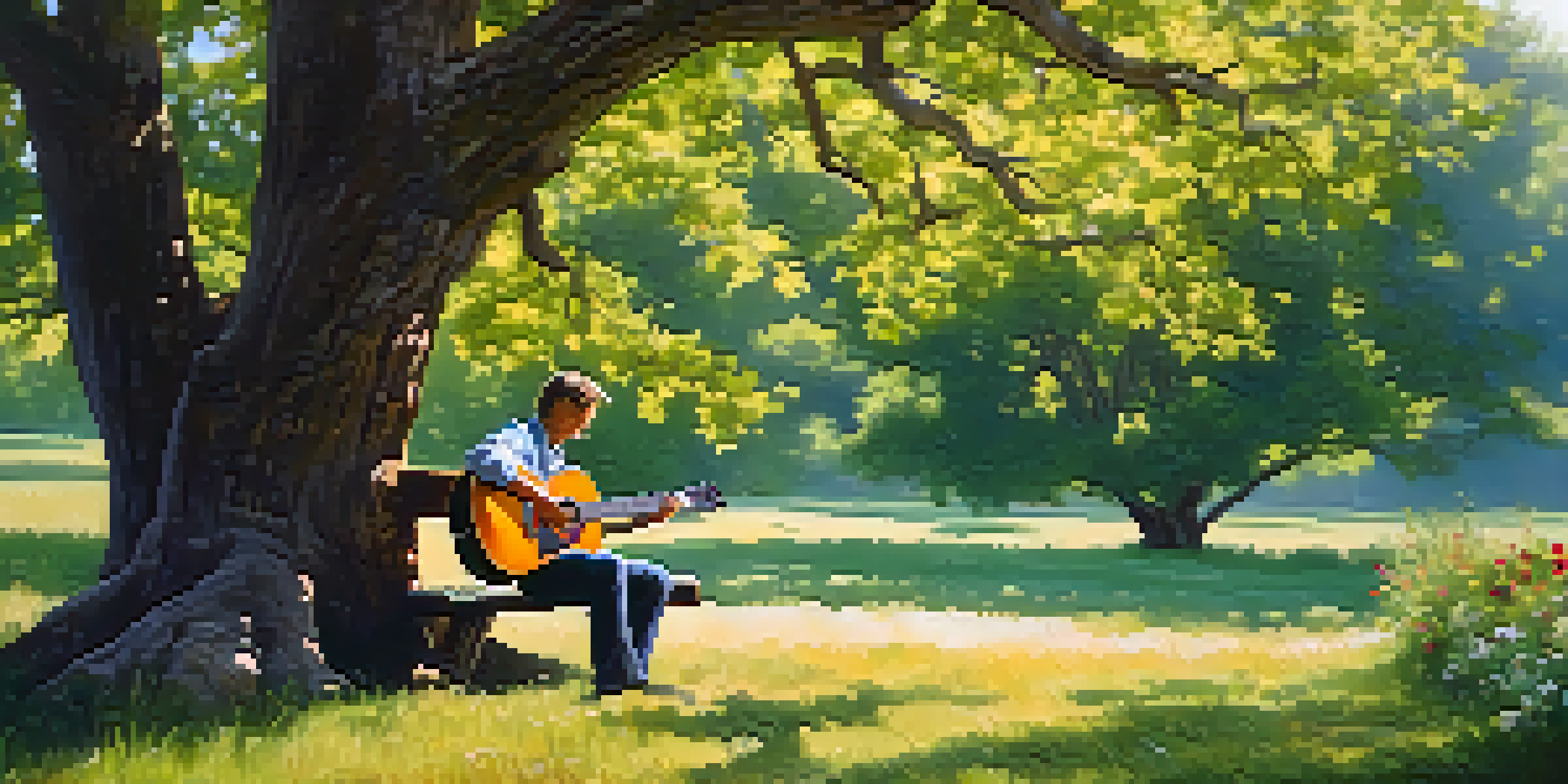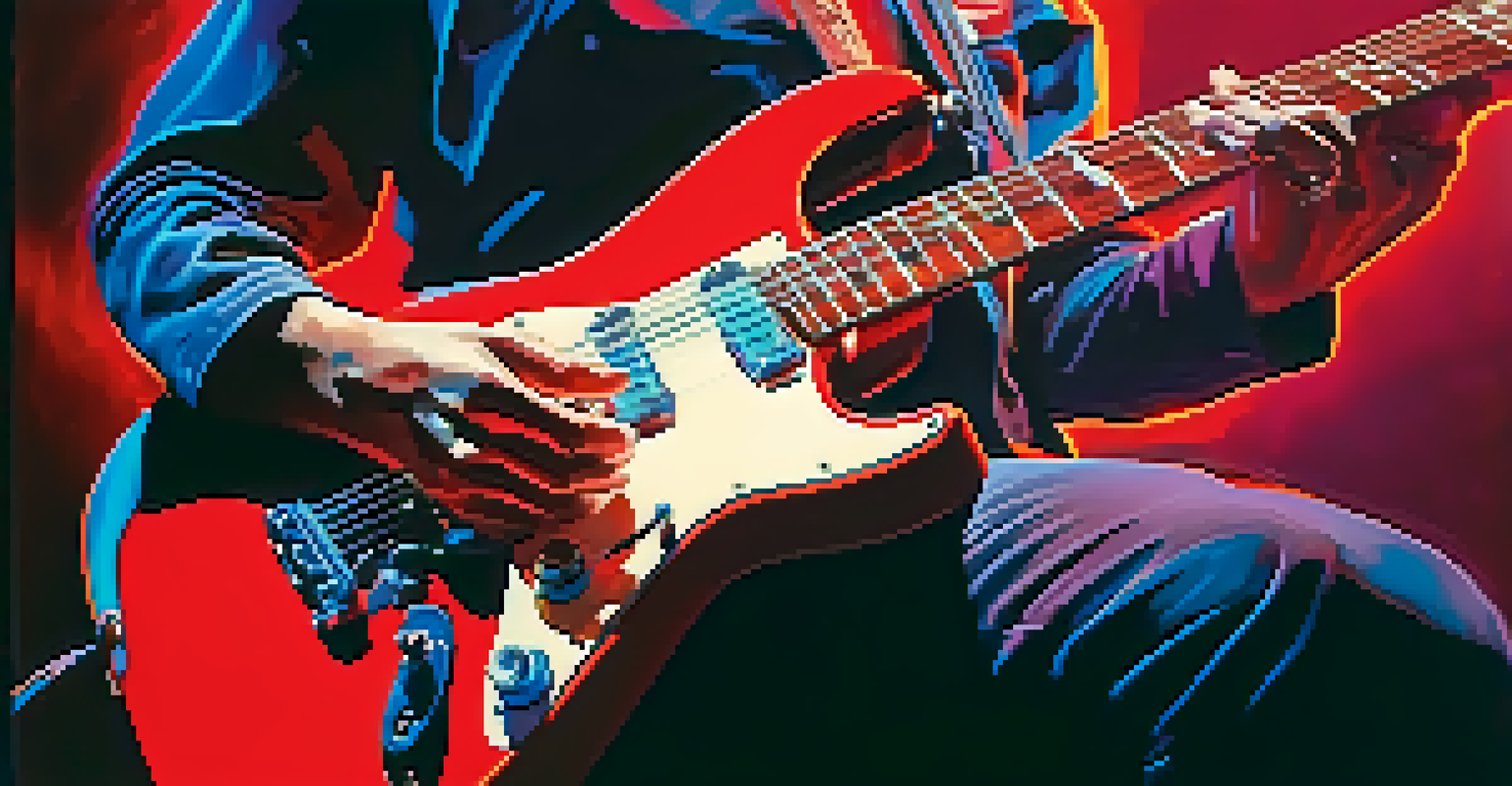The Guitar as a Tool for Storytelling in Various Cultures

The Guitar's Role in Cultural Narratives
Throughout history, the guitar has been a vital instrument in storytelling, transcending borders and cultures. It serves not only as a musical tool but also as a vessel for conveying emotions and narratives. From the folk songs of Appalachia to the flamenco rhythms of Spain, the guitar weaves tales that resonate with listeners on a deep level.
The guitar is a wonderful instrument which is always in tune, even when it’s out of tune.
In many cultures, songs played on the guitar encapsulate the struggles, joys, and everyday life of people. These narratives often reflect the values and traditions of a community, making the guitar a bridge between generations. For instance, in Mexican culture, the mariachi guitar not only entertains but also tells stories of love, loss, and celebration.
Moreover, the improvisational nature of guitar playing allows storytellers to adapt their tales in real-time. This flexibility fosters a dynamic interaction with the audience, making each performance a unique experience. As a result, the guitar becomes a living chronicle of human experience, rich with history and emotion.
Guitar and the Oral Tradition
Oral traditions are the backbone of many cultures, and the guitar often plays a crucial role in this storytelling method. In countless societies, musicians use the guitar to share folklore, legends, and moral lessons that have been passed down through generations. This oral exchange not only preserves history but also strengthens community bonds.

For instance, in the indigenous cultures of South America, guitarists accompany storytellers, enhancing the narrative with melodies that evoke the essence of the tales. The music provides a backdrop that enriches the listener's experience, making the stories come alive. This collaboration between words and music helps in retaining cultural identities.
Guitar as a Storytelling Tool
The guitar transcends cultures and serves as a vital instrument for conveying emotions and narratives through music.
Additionally, as communities evolve, so do their stories and the ways they are shared. The guitar adapts to these changes, incorporating new styles and influences while still honoring traditional narratives. This adaptability ensures that the art of storytelling remains relevant and engaging across generations.
Guitar in Protest and Social Movements
The guitar has been a powerful tool in social movements, serving as a voice for the voiceless. Throughout history, musicians have used their craft to shed light on injustices and inspire change. Iconic songs, often accompanied by compelling guitar riffs, have rallied communities and ignited passion for causes.
Music can change the world because it can change people.
One notable example is the folk music revival of the 1960s, where artists like Bob Dylan and Joan Baez harnessed the guitar to address civil rights and anti-war sentiments. Their songs told stories of struggle and hope, creating a soundtrack for a generation yearning for change. Such performances not only entertained but also educated and mobilized audiences.
Furthermore, the guitar continues to be a symbol of resistance in various cultures today. From protest songs in the streets of Iran to the rhythms of reggae in Jamaica, the guitar remains a conduit for expressing dissent and advocating for social justice. Its ability to tell powerful stories makes it an enduring instrument in the fight for equality.
The Guitar in Spiritual and Ritualistic Practices
In many cultures, the guitar is not just an instrument for entertainment; it also plays a significant role in spiritual and ritualistic practices. Musicians often use it to create an atmosphere conducive to meditation, worship, or celebration. The melodies produced can evoke feelings of transcendence and connection to the divine.
For example, in certain African and Caribbean traditions, the guitar is used in ceremonies that honor ancestors and spirits. The music becomes a means of communication with the supernatural, with each strum telling a story of reverence and respect. This use of the guitar highlights its versatility as both a storytelling and spiritual tool.
Guitar's Role in Social Movements
Throughout history, the guitar has been a powerful voice in social movements, inspiring change and rallying communities.
Moreover, the incorporation of the guitar in religious practices often leads to unique musical forms that blend cultural influences. This fusion not only enriches the spiritual experience but also helps in preserving cultural heritage. As a result, the guitar bridges the gap between the mundane and the sacred, making it a cherished instrument across various belief systems.
The Guitar as a Means of Personal Expression
For many, the guitar serves as a personal diary, a means to express individual stories and emotions. Aspiring musicians often turn to this instrument to articulate their feelings in ways that words alone cannot capture. The process of writing and playing songs can be cathartic, allowing individuals to explore their innermost thoughts.
Take, for instance, the singer-songwriter tradition, where artists like Joni Mitchell and Ed Sheeran use their guitars to tell deeply personal stories. Their lyrics, combined with compelling melodies, create a relatable narrative that resonates with audiences. This personal connection transforms the guitar into a conduit for shared human experience.
Furthermore, as people navigate their own life challenges, they often find solace in creating music. The guitar becomes a companion in moments of joy, sorrow, and reflection. This intimate relationship between the musician and their instrument showcases the guitar's role as a storyteller of the self, making each performance a unique narrative.
Global Fusion: The Guitar's Influence on World Music
The guitar's versatility has led to its fusion with various musical traditions around the world. Its adaptability allows it to meld seamlessly with different genres, creating rich, hybrid forms of music. From jazz to blues, and from rock to classical, the guitar has influenced countless styles while retaining its storytelling essence.
In places like Brazil, the guitar has been integral to the development of bossa nova, a genre that tells stories of love and longing through its smooth melodies. Similarly, in India, the guitar blends with traditional instruments to create contemporary interpretations of classical music, showcasing the storytelling aspect of both cultures. This global fusion enriches the musical landscape and broadens the narrative scope.
Personal Expression through Guitar
For many musicians, the guitar acts as a personal diary, allowing them to express individual stories and emotions in a relatable way.
Moreover, as artists collaborate across cultures, new stories emerge, reflecting diverse experiences and perspectives. The guitar's ability to adapt and evolve ensures that it remains a relevant tool for storytelling in an ever-changing world. This collaborative spirit fosters a sense of unity, celebrating the universal nature of human experiences.
The Future of Guitar Storytelling
As technology evolves, so does the way we experience guitar storytelling. New platforms for music sharing, like social media and streaming services, have made it easier for artists to reach global audiences. This shift not only amplifies diverse voices but also redefines how stories are told through music.
Additionally, the rise of virtual collaborations allows musicians from different backgrounds to create and share their stories together. This interconnectedness fosters a vibrant musical community, where the guitar continues to play a central role in storytelling. As artists blend traditional and modern techniques, they keep the narrative alive and relevant.

Looking ahead, the guitar will undoubtedly remain a powerful tool for storytelling. Its rich history, combined with contemporary influences, ensures that new tales will emerge, resonating with audiences around the world. In this way, the guitar continues to be a testament to the enduring power of music in shaping and sharing our stories.